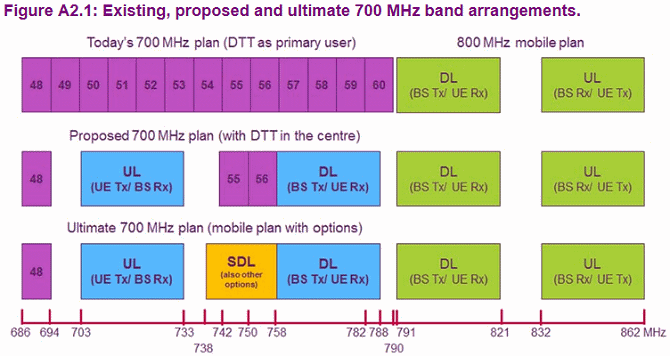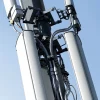Ofcom – TV Interference Not a Big Problem for Mobile Broadband at 700MHz
The telecoms regulator has today said that only a “small number of households [up to 36,000] may be affected by interference” when they shift UK Digital Terrestrial TV (DTT) services out of the 700MHz spectrum band (TV will go to 600MHz) and replace it with Mobile Broadband (4G, 5G).
Using 700MHz (694-790MHz) for Mobile Broadband will allow Mobile Network Operators (MNO), such as Three UK, EE (BT), O2 and Vodafone, to cover a wider area (plus better indoor coverage) and for less cost. However the data speeds at that frequency won’t be quite as fast (i.e. assuming Ofcom makes less spectrum available at lower frequencies) but they may still improve thanks to the greater potential for Carrier Aggregation (boosting speeds by harnessing several different bands at once).
Ofcom has previously said that they could free up the 700MHz band for use by Mobile Broadband services in time for Q2 2020, although much like the earlier re-purposing of the 800MHz band there is still a risk of interference between the bands and this could cause disruption to some services.
Advertisement

The regulator has already done some preliminary analysis of technical coexistence between the radio spectrum bands and today’s consultation reflects a much more detailed study of the potential problem areas, including via field trials with various UK households.
The good news is that it doesn’t look as if interference is going to be a major headache for home owners, with projections suggesting that there will be “no more than” 36,000 confirmed interference cases arising from mobile services in the 700MHz band.
The Latest Findings
A small number of households may be affected by interference from mobile base stations in the 700 MHz band
1.6 Our projections based on data from the current 800 MHz mitigation scheme indicate that there will be between 25,000 and 36,000 confirmed interference cases by the end of 800 MHz network roll-out. This is less than 0.2% of DTT households in the UK. We expect that the number of 700 MHz interference cases will be broadly similar.
1.7 Our measurements show that there may be a small degradation with 800 and 700 MHz base stations together compared to 800 MHz base stations alone. However, other factors will tend to reduce the interference risk relative to 800 MHz; these include greater frequency separation between mobile base stations and DTT, and improvements in DTT receiver performance which are expected to take effect over the next few years. Overall we consider that the impact of interference from 700 MHz base stations will be no greater than the impact seen in the 800 MHz band.
Our measurements indicate a minimal risk of interference from mobile handsets
1.8 The data from our handset measurement campaign shows that the vast majority of households will not experience any interference from mobile handsets.
1.9 Households with television receivers that perform poorly and that are in an area of relatively high handset activity might experience a single transient picture interruption on average around once every 100 hours of viewing standard definition TV. For high definition (HD), the equivalent figure would be just one interruption in 10,000 hours of viewing.
We expect that receiver filters will be the most technically effective means to mitigate interference from handsets and base stations
1.10 Receiver filters work by allowing wanted signals (DTT) to pass through while reducing unwanted interfering signals. They are the primary mitigation technique currently used for mitigating interference to DTT reception from mobile services in the 800 MHz band.
1.11 The filters used in the 800 MHz band are designed to stop signals between 791 and 862 MHz. Following the change of use of the 700 MHz band, new filters will be needed that block signals across both the 700 and 800 MHz bands (694-862 MHz).
Readers may recall that there were initially quite a few concerns about the impact that the 800MHz Mobile band might have on terrestrial TV services, although in the end the concerns proved to be unfounded and interference cases were few and far between. The same is clearly expected for 700MHz.
Advertisement
Meanwhile Ofcom’s consultation will remain open for feedback until 14th July 2017.
Mark is a professional technology writer, IT consultant and computer engineer from Dorset (England), he also founded ISPreview in 1999 and enjoys analysing the latest telecoms and broadband developments. Find me on X (Twitter), Mastodon, Facebook, BlueSky, Threads.net and Linkedin.
« UPDATE2 Openreach (BT) Stops Taking New Customers for 18Mbps FTTC Trial
O2 UK Launches EU Mobile Roaming “at no extra cost” »
















































Comments are closed